The International Foundation for Science (IFS) and the Southeast Asian Regional Center for Graduate Study and Research in Agriculture (SEARCA) had a ceremonial signing of its Memorandum of Agreement (MOA) on the Mentorship Program for Advanced Grants and launched the call for research borne of this agreement on 26 November 2020, 1:00 p.m. (GMT +8:00) via the platform Zoom and Facebook.
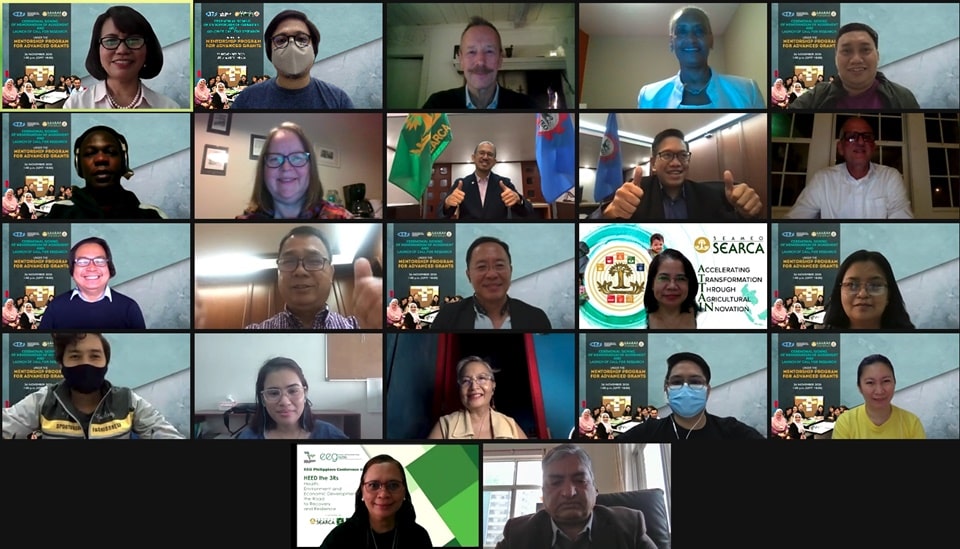
IFS and SEARCA share the objective of building research capacities of early-career scientists, with focus on Southeast Asia in this collaboration. The complex and evolving contexts in the region call for developing researchers and the next generation of young scientists who can contribute to addressing the attendant challenges. This underpins the mentorship program which aims to support early career scientists who will be awarded IFS-SEARCA grants to carry out individual or collaborative research. They will be provided with various opportunities to work with established researchers who will guide them through a range of capability-enhancing interactions that are specific to grantees’ professional needs, from their particular discipline’s content to research and interpersonal skills.
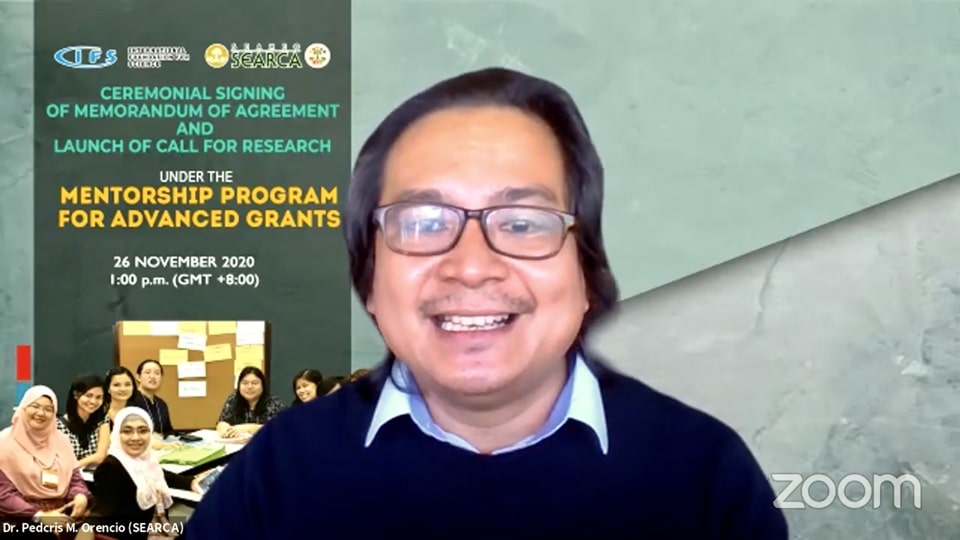 In his opening remarks, Dr. Pedcris M. Orencio, SEARCA’s Program Head for Research and Thought Leadership, underscored the need for beneficial partnerships and the importance of research, which is the centerpiece of this collaboration. He asserted that ‘research formally articulates the truth’ and that collaborative research increases productivity and quality. He likewise affirmed the value of the mentorship program as an approach to enhancing the conduct of research and as an intervention to nurturing young minds and honing skills through the guidance of technical experts and those with decades of research experience.
In his opening remarks, Dr. Pedcris M. Orencio, SEARCA’s Program Head for Research and Thought Leadership, underscored the need for beneficial partnerships and the importance of research, which is the centerpiece of this collaboration. He asserted that ‘research formally articulates the truth’ and that collaborative research increases productivity and quality. He likewise affirmed the value of the mentorship program as an approach to enhancing the conduct of research and as an intervention to nurturing young minds and honing skills through the guidance of technical experts and those with decades of research experience.
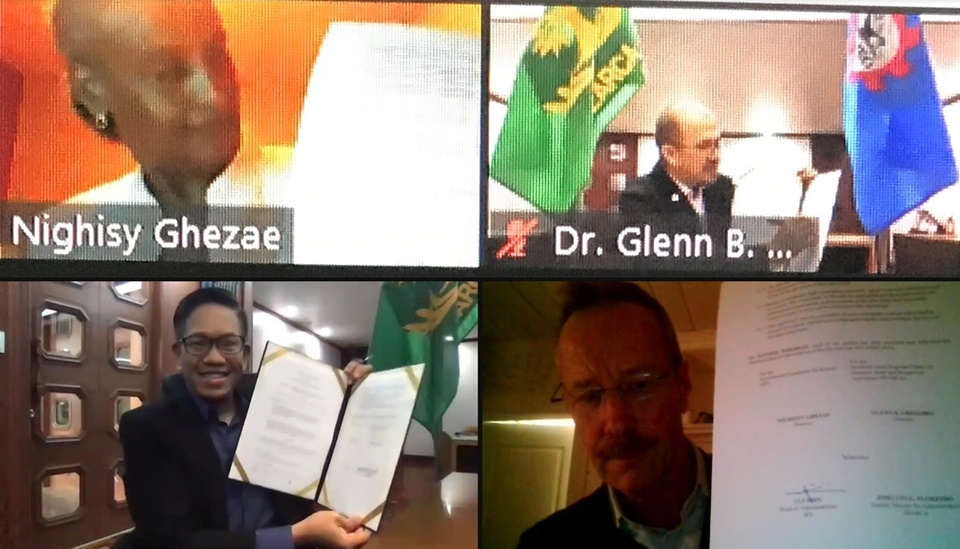
The ceremonial signing of the MOA by the Directors of IFS and of SEARCA, witnessed by their respective heads of administration, Mr. Ulf Edin for IFS and Prof. Joselito Florendo for SEARCA, was followed by messages from the heads of the two organizations. Dr. Nighisty Ghezae, IFS Executive Director, considers the IFS-SEARCA collaboration as crucial in supporting early-career scientists. She described the partnership as an initiative to contribute to solutions in Southeast Asia and to ‘provide evidence in support of food security policy and programming during this time of global pandemic and consequent economic and social crises.’ She called for food systems that are less carbon intensive but are more carbon resilient. She urged ‘doing everything we can to invest in a better future where food systems are cornerstones of a healthy economy, healthy people, and a healthy planet’. It is hoped that this effort will contribute to the achievement of the Sustainable Development Goals.

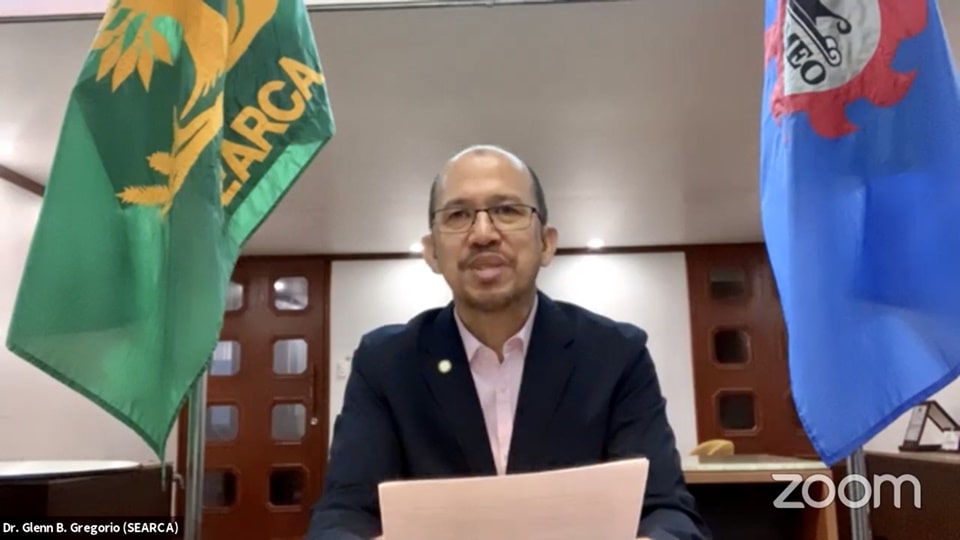
Dr. Glenn B. Gregorio, SEARCA Director, highlighted the role of higher education and research institutions, particularly in this global pandemic, to ‘promote a transformative mindset and produce experts who understand the growing complex social concerns and are able to contribute positive change now and in the future.’ He further shared that SEARCA’s 11th Five Year Plan (FYP), with the theme of Accelerating Transformation through Agricultural Innovation (ATTAIN), aims to bridge the gap that burdens smallholder farmers and farming families and emphasized the need for better, bigger, and smarter impacts. He affirmed the need for ‘scientists, researchers, and young people who are good in doing basic and advanced science and who can also navigate the development dimension of their work to shorten the gap between research, productivity, and their translation to economic development.’
The call for research was launched through an audiovisual presentation. The Advanced Grants (up to US$20,000) is open to nationals of Cambodia, Indonesia, Lao PDR, Myanmar, Philippines, Vietnam, and Timor Leste, provided that they are enrolled in a PhD program or have recently completed a Master’s or PhD degree within the five years before the call, with proven limited access to start-up funds for their research. The proposed project, with its contribution to knowledge and practice in food security, must fall within the common thematic priorities of IFS (Biological Resources in Terrestrial Systems, Water and Aquatic Resources, and Food Security, Dietary Diversity and Healthy Livelihoods) and SEARCA (under its 11th FYP), and must be applied or developmental research.
This is the second collaboration of the two organizations. The first was in 2015-2019 on the IFS-SEARCA Collaborative Grants Pilot in Southeast Asia which awarded research grants to 12 teams composed of a total of 41 researchers/scientists from eight countries in Southeast Asia. The research focus then was on climate change adaptation and mitigation.
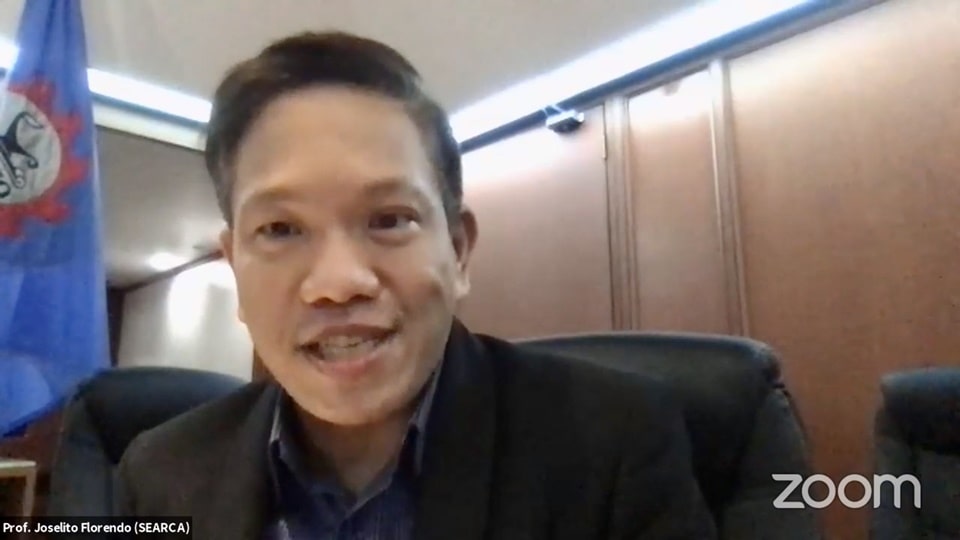 The call to own this grants opportunity and to send in an application was echoed by SEARCA Deputy Director for Administration Prof. Joselito Florendo in his closing remarks. He stressed that the gains that come with the grant, from lessons learned from crafting the proposal, to implementation of the project, to harvesting of results and outputs, and to the utilization of these results to benefit Southeast Asia and the world are significant.
The call to own this grants opportunity and to send in an application was echoed by SEARCA Deputy Director for Administration Prof. Joselito Florendo in his closing remarks. He stressed that the gains that come with the grant, from lessons learned from crafting the proposal, to implementation of the project, to harvesting of results and outputs, and to the utilization of these results to benefit Southeast Asia and the world are significant.
IFS is a non-government organization based in Stockholm, Sweden which fosters original Research and Scientific growth within Low- and Lower -Middle Income Countries (LLMICs). Its vision is for LLMIC scientists to assume ownership and development of local and regional research agendas and contributing to a global research community committed to supporting sustainable development and building science literacy.
SEARCA is the Southeast Asian Ministers of Education Organization’s (SEAMEO) center of excellence in agriculture mandated to provide to SEA high quality graduate study in agriculture; promote, undertake, and coordinate research programs related to the needs and problems of SEA; and disseminate the findings of agricultural research and experimentation.